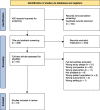The effectiveness of skilled breathing and relaxation techniques during antenatal education on maternal and neonatal outcomes: a systematic review
- PMID: 36402944
- PMCID: PMC9675115
- DOI: 10.1186/s12884-022-05178-w
The effectiveness of skilled breathing and relaxation techniques during antenatal education on maternal and neonatal outcomes: a systematic review
Abstract
Background: Several studies have investigated the relationship between antenatal education classes and pregnancy outcomes. These studies have shown positive effects on mothers, such as a lower epidural rate in the intervention groups. However, until now, the impact on outcomes for mothers and newborns of antenatal education classes that focus on breathing and relaxation techniques has not been examined.
Aim: Investigate the effects of skilled breathing and relaxation techniques provided in antenatal education classes on maternal and neonatal birth outcomes.
Methods: The protocol for this study was registered with PROSPERO (ID: CRD42020192289). A systematic literature search was undertaken and completed in January 2022, using the databases MEDLINE, CINAHL, clinicalTrials.gov, Cochrane Library, Embase and MIDIRS according to a priori formulated PICO criteria: population (pregnant women), intervention (antenatal education classes with integrated breathing and relaxation techniques), comparison (antenatal education classes that do not include skilled breathing and relaxation techniques), and outcome (maternal and neonatal outcomes). The quality of the studies was assessed by two reviewers using the standardised instruments RoB 2 and ROBINS-I.
Results: Ten studies were included in this review, nine randomised controlled trials and one quasi-experimental study. The results indicate that skilled breathing and relaxation techniques may positively influence self-efficacy, the need for pharmacological support, specifically the use of epidural anaesthesia, and the memory of labour pain. No effects were found in relation to predefined neonatal outcomes. The quality of evidence on maternal and neonatal outcomes is inconsistent across studies, as different antenatal education classes with varying interventions, including breathing and relaxation techniques, were offered in the studies.
Conclusions: Women who attended an antenatal education class with breathing and relaxation techniques appear to benefit from the intervention. This applies to the practical implementation and use of breathing and relaxation techniques during labour, increased self-confidence and self-efficacy, and a increased feeling of being in control during labour. This demonstrates the importance of information provision and a focus on breathing and relaxation techniques in antenatal education.
Keywords: Antenatal classes; Breathing exercise; Childbirth preparation; Maternal; Neonatal and birth outcomes.
© 2022. The Author(s).
Conflict of interest statement
The authors declare that they have no competing interests.
Figures
References
-
- Hassanzadeh R, Abbas-Alizadeh F, Meedya S, Mohammad-Alizadeh-Charandabi S, Mirghafourvand Perceptions of primiparous women about the effect of childbirth preparation classes on their childbirth experience: a qualitative study. Midwifery. 2021;103:103154. doi: 10.1016/j.midw.2021.103154. - DOI - PubMed
Publication types
MeSH terms
LinkOut - more resources
Full Text Sources
Medical




